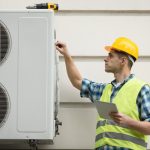Decoding HVAC Laws: Compliance and Impact on Heating and Cooling Systems
January 13, 2024 6:19 pm Leave your thoughts
1. Energy Efficiency Standards:
One of the main objectives of HVAC laws is to improve energy efficiency and reduce energy consumption. Many countries and states have implemented energy efficiency standards for HVAC systems. These standards set minimum requirements for the efficiency of heating and cooling equipment. By complying with these standards, building owners can not only reduce their energy bills but also contribute to reducing greenhouse gas emissions and combatting climate change.
2. Refrigerant Regulations:
Refrigerants used in HVAC systems play a significant role in both performance and environmental impact. Traditional refrigerants such as chlorofluorocarbons (CFCs) and hydrochlorofluorocarbons (HCFCs) have been found to have a harmful impact on the ozone layer. As a result, there has been a phase-out of these refrigerants, and regulations now require the use of environmentally friendly alternatives, such as hydrofluorocarbons (HFCs) with low global warming potential (GWP). Compliance with these refrigerant regulations ensures the responsible use and disposal of refrigerants, which is crucial for minimizing the environmental impact of HVAC systems.
3. Installation and Maintenance Requirements:
Proper installation and regular maintenance of HVAC systems are essential for their efficient and safe operation. HVAC laws often include requirements for the installation, commissioning, and inspection of heating and cooling systems. These regulations aim to ensure that HVAC systems are installed correctly, follow safety standards, and meet the necessary performance criteria. Regular maintenance and inspections are also important to ensure that HVAC systems continue to operate efficiently and meet the required standards.
4. Indoor Air Quality Standards:
Indoor air quality (IAQ) regulations focus on the quality of the air inside buildings, including homes, offices, and public spaces. Proper ventilation and filtration of air are critical for maintaining good IAQ. HVAC laws often include requirements for the design and installation of ventilation systems, as well as the use of air filters that meet specific efficiency standards. Compliance with IAQ standards ensures that building occupants have clean and healthy air to breathe, which is particularly crucial for sensitive populations such as those with respiratory conditions or allergies.
5. Compliance and Non-Compliance Consequences:
Compliance with HVAC laws and regulations is of utmost importance for building owners, HVAC contractors, and technicians. Non-compliance can result in serious consequences, including legal penalties, fines, and even the shutting down of non-compliant systems. Building owners may face financial costs due to inefficient systems or the need to retrofit non-compliant HVAC equipment. It is therefore crucial for all stakeholders to stay informed about the applicable laws, engage with reputable HVAC professionals, and ensure proper compliance to avoid these consequences.
Summary
HVAC laws have a significant impact on heating and cooling systems in commercial and residential buildings. These laws aim to improve energy efficiency, reduce greenhouse gas emissions, and ensure the safe and proper installation and maintenance of HVAC equipment. Compliance with these laws not only helps building owners save on energy costs but also contributes to a healthier and more sustainable environment. It is essential for all stakeholders to stay informed about the latest regulations, engage with qualified HVAC professionals, and ensure proper compliance to reap the benefits of efficient and environmentally responsible HVAC systems.
Need a HVAC Technician in Mabank, TX?
Ken’s Comfort Zone Air Conditioning is proud to remain a family-owned and -operated business, providing residential clients and businesses alike with a complete range of central heating, air conditioning, and ventilation services, including service calls, repairs, and installations. We’re proud to have been awarded the Monitor Newspaper 2015 Ceder Creek Lake area Readers’ Choice Award for best air conditioning contractor. Additionally, we carry an A+ rating with the Better Business Bureau and are members of the local Chamber of Commerce and the NFIB. For your peace of mind, Ken’s Comfort Zone Air Conditioning is fully licensed, bonded, and insured. Call us today for all of your HVAC needs!
Categorised in: HVAC, HVAC Laws
This post was written by admin
